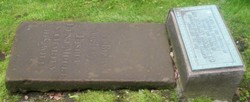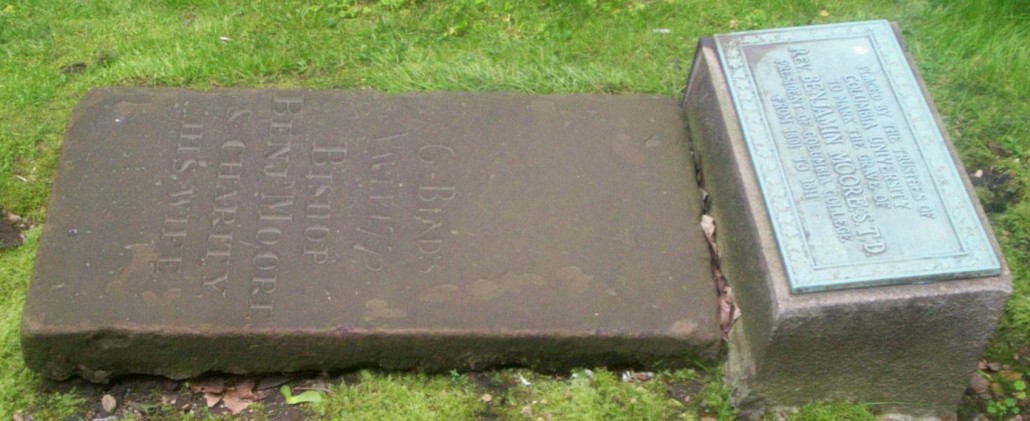Married Benjamin (Rev.) MOORE 1748 – 1816 on 20 Apr 1778 in Trinity Church, New York City; parents of one child:
Clement Clarke MOORE 1779 – 1863 (the author of "A Visit from St. Nicholas" later known as "Twas The Night Before Christmas")
"Charity Clarke was born June 28, 1747. Her father, Major Thomas Clarke, was a retired British veteran of the French and Indian War. He named his property in lower Manhattan Chelsea – at the time a country estate – for the soldiers' hospital near London, and thus gave a name to the Chelsea neighborhood of New York City. The Clarke estate encompassed the area that is now 18th to 24th Streets between Eighth and Tenth Avenues in Manhattan. The Chelsea mansion was located at what is now Eighth Avenue and West 23rd Street, and Charity inherited the entire estate.
In her early 20s, Charity Clarke was a young New York City woman with strong opinions about the growing tensions caused by Great Britain's tightening grip on the American colonies. Between 1768 and 1774, she wrote a series of letters to her cousin Joseph Jekyll, a London lawyer. These letters show her disdain for the policies of the English Monarchy and her growing sense of patriotism in the period leading up to the American Revolution.
Charity wrote on November 6, 1768, "When there is the least show of oppression or invading of liberty you may depend on our working ourselves to the utmost of our power." What made her so angry was the landing in Boston a month earlier of a garrison of British soldiers to quell increasing disorders brought about by the Townshend Acts, which charged customs duties on a number of imports, including tea.
Charity Clarke signed her letters, "Your friend and affectionate cousin," but she could be slyly sarcastic when the occasion called for it:
What a pretty figure your expedition to Boston will make in history. They may now employ themselves in gathering of shells or what may please for they have nothing else to do. As to insurrections, we know of none. And unruly mobs we'll leave to England, they don't govern America.
On March 31, 1769, Clarke echoed a general sentiment among Americans: an accommodation with Great Britain, not a separation. One of the weapons being used by the colonies was a restriction on English imports, a tactic that caused many problems:
The attention of every American is fixed on England. The last accounts from thence are very displeasing to those who wish a good understanding between Britain and her colonies. The Americans are firm in their resolution of no importations from England. The want of money is so great among us that land sells for less than half price. The merchants have no cash to buy bills of exchange, which are now very low.
The following June, Clarke announced her readiness to join "a fighting army of Amazons," who would take to take to the hills, if necessary, to flee the oppressive British:
If you English folks won't give us the liberty we ask... I will try to gather a number of ladies armed with spinning wheels [along with men] who shall all learn to weave & keep sheep, and will retire beyond the reach of arbitrary power, clothed with the work of our hands, feeding on what the country affords... In short, we will found a new Arcadia.
At the age of 32 – quite late in life to marry at that time – Charity Clarke married Right Reverend Benjamin Moore DD April 20, 1778, in NY. He was the second Episcopal Bishop of New York, Rector of Trinity Church, and President of Columbia College (now Columbia University).
Their only child, Clement Clarke Moore, was born on July 15, 1779, at his parents' Chelsea estate, Clement Moore was educated at home in his early youth and graduated first in his class from Columbia in 1798. He became a respected biblical scholar, but is best-known for his poem, A Visit From St. Nicholas or The Night Before Christmas. The poem, written solely for the amusement of Moore's own children, was read aloud for the first time one snowy Christmas Eve in 1822.
Reverend Benjamin Moore died Feb 27, 1816, at Greenwich Village.
Charity Clarke Moore died December 4, 1838, at the age of 91."
From "Women in the American Revolution"
[Thanks to janicet (#47361005)]
Married Benjamin (Rev.) MOORE 1748 – 1816 on 20 Apr 1778 in Trinity Church, New York City; parents of one child:
Clement Clarke MOORE 1779 – 1863 (the author of "A Visit from St. Nicholas" later known as "Twas The Night Before Christmas")
"Charity Clarke was born June 28, 1747. Her father, Major Thomas Clarke, was a retired British veteran of the French and Indian War. He named his property in lower Manhattan Chelsea – at the time a country estate – for the soldiers' hospital near London, and thus gave a name to the Chelsea neighborhood of New York City. The Clarke estate encompassed the area that is now 18th to 24th Streets between Eighth and Tenth Avenues in Manhattan. The Chelsea mansion was located at what is now Eighth Avenue and West 23rd Street, and Charity inherited the entire estate.
In her early 20s, Charity Clarke was a young New York City woman with strong opinions about the growing tensions caused by Great Britain's tightening grip on the American colonies. Between 1768 and 1774, she wrote a series of letters to her cousin Joseph Jekyll, a London lawyer. These letters show her disdain for the policies of the English Monarchy and her growing sense of patriotism in the period leading up to the American Revolution.
Charity wrote on November 6, 1768, "When there is the least show of oppression or invading of liberty you may depend on our working ourselves to the utmost of our power." What made her so angry was the landing in Boston a month earlier of a garrison of British soldiers to quell increasing disorders brought about by the Townshend Acts, which charged customs duties on a number of imports, including tea.
Charity Clarke signed her letters, "Your friend and affectionate cousin," but she could be slyly sarcastic when the occasion called for it:
What a pretty figure your expedition to Boston will make in history. They may now employ themselves in gathering of shells or what may please for they have nothing else to do. As to insurrections, we know of none. And unruly mobs we'll leave to England, they don't govern America.
On March 31, 1769, Clarke echoed a general sentiment among Americans: an accommodation with Great Britain, not a separation. One of the weapons being used by the colonies was a restriction on English imports, a tactic that caused many problems:
The attention of every American is fixed on England. The last accounts from thence are very displeasing to those who wish a good understanding between Britain and her colonies. The Americans are firm in their resolution of no importations from England. The want of money is so great among us that land sells for less than half price. The merchants have no cash to buy bills of exchange, which are now very low.
The following June, Clarke announced her readiness to join "a fighting army of Amazons," who would take to take to the hills, if necessary, to flee the oppressive British:
If you English folks won't give us the liberty we ask... I will try to gather a number of ladies armed with spinning wheels [along with men] who shall all learn to weave & keep sheep, and will retire beyond the reach of arbitrary power, clothed with the work of our hands, feeding on what the country affords... In short, we will found a new Arcadia.
At the age of 32 – quite late in life to marry at that time – Charity Clarke married Right Reverend Benjamin Moore DD April 20, 1778, in NY. He was the second Episcopal Bishop of New York, Rector of Trinity Church, and President of Columbia College (now Columbia University).
Their only child, Clement Clarke Moore, was born on July 15, 1779, at his parents' Chelsea estate, Clement Moore was educated at home in his early youth and graduated first in his class from Columbia in 1798. He became a respected biblical scholar, but is best-known for his poem, A Visit From St. Nicholas or The Night Before Christmas. The poem, written solely for the amusement of Moore's own children, was read aloud for the first time one snowy Christmas Eve in 1822.
Reverend Benjamin Moore died Feb 27, 1816, at Greenwich Village.
Charity Clarke Moore died December 4, 1838, at the age of 91."
From "Women in the American Revolution"
[Thanks to janicet (#47361005)]





